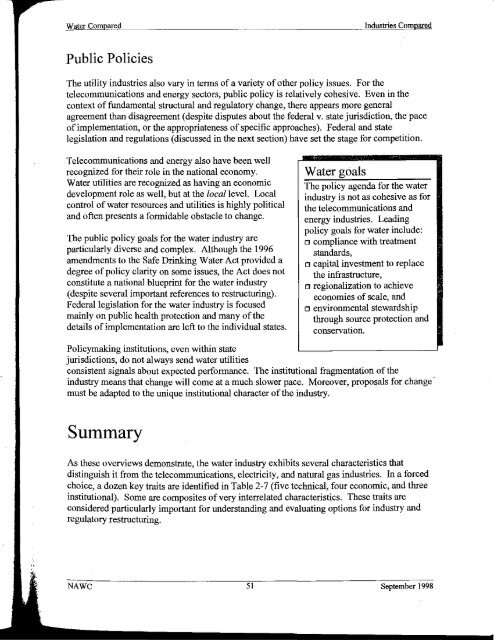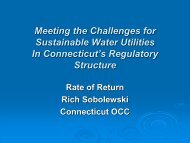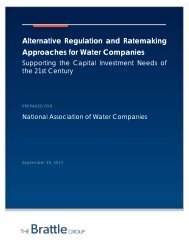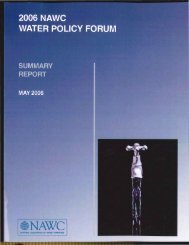BEECHER - NAWC
BEECHER - NAWC
BEECHER - NAWC
You also want an ePaper? Increase the reach of your titles
YUMPU automatically turns print PDFs into web optimized ePapers that Google loves.
Water ComparedIndustries ComparedPublic PoliciesThe utility industries also vary in terms of a variety of other policy issues. For thetelecommunications and energy sectors, public policy is relatively cohesive. Even in thecontext of fundamental structural and regulatory change, there appears more generalagreement than disagreement (despite disputes about the federal v. state jurisdiction, the paceof implementation, or the appropriateness of specific approaches). Federal and statelegislation and regulations (discussed in the next section) have set the stage for competition.Telecommunications and energy also have been wellrecognized for their role in the national economy.Water utilities are recognized as having an economicdevelopment role as well, but at the local level. Localcontrol of water resources and utilities is highly politicaland often presents a formidable obstacle to change.The public policy goals for the water industry areparticularly diverse and complex. Although the 1996amendments to the Safe Drinking Water Act provided adegree of policy clarity on some issues, the Act does notconstitute a national blueprint for the water industry(despite several important references to restructuring).Federal legislation for the water industry is focusedmainly on public health protection and many of thedetails of implementation are left to the individual states.Water goalsThe policy agenda for the waterindustry is not as cohesive as forthe telecommunications andenergy industries. Leadingpolicy goals for water include:o compliance with treatmentstandards,o capital investment to replacethe infrastructure,o regionalization to achieveeconomies of scale, ando environmental stewardshipthrough source protection andconservation.Policyrnaking institutions, even within statejurisdictions, do not always send water utilitiesconsistent signals about expected performance. The institutional fragmentation of theindustry means that change will come at a much slower pace. Moreover, proposals for change·must be adapted to the unique institutional character of the industry.SummaryAs these overviews demonstrate, the water industry exhibits several characteristics thatdistinguish it from the telecommunications, electricity, and natural gas industries. In a forcedchoice, a dozen key traits are identified in Table 2-7 (five technical, four economic, and threeinstitutional). Some are composites of very interrelated characteristics. These traits areconsidered particularly important for understanding and evaluating options for industry andregulatory restructuring.<strong>NAWC</strong> 51 September 1998
















